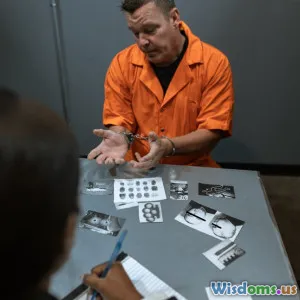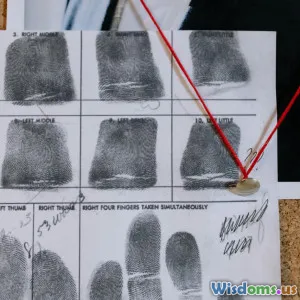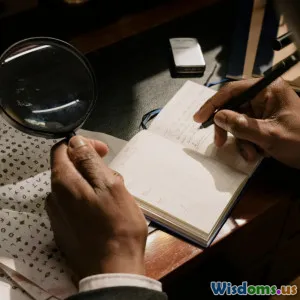
The Role of Psychology in Crime Investigation
8 min read Explore how psychology shapes crime investigations, enhancing criminal profiling, interrogation, and solving complex cases. (0 Reviews)
The Role of Psychology in Crime Investigation
Crime investigation has long been a complex puzzle, demanding not only physical evidence but also a deep understanding of human behavior. Psychology, the scientific study of the mind and behavior, plays a crucial role by providing unique insights that aid investigators in unraveling criminal minds and motives. This article explores how psychological principles contribute to crime investigations, leading to more effective law enforcement and justice outcomes.
Introduction: The Mind Behind the Crime
Imagine a detective standing over a crime scene, scrutinizing not just the physical traces but also trying to decipher the mindset behind the criminal act. This fusion of forensic science and psychology is powerful because crimes rarely happen in a vacuum; they are the manifestation of human thought, emotion, and behavior.
Psychology’s role in crime investigation extends far beyond stereotypes often portrayed in media. It provides a structured approach to understand offenders’ motivations, predict future actions, and reveal hidden truths from witnesses and suspects. As Dr. David Canter, a pioneer in investigative psychology, stated, “The most powerful weapon law enforcement has is its ability to understand human nature.”
Psychological Profiling: Mapping the Criminal Mind
One of the most recognized applications of psychology in criminal investigations is offender profiling, or criminal profiling. This technique offers a behavioral and psychological sketch of an unknown offender based on crime scene evidence and victimology.
Origins and Methodology
Profiling gained prominence in the 1970s when the FBI’s Behavioral Science Unit began compiling data on serial offenders. Investigators examined patterns in methods, personalities, and behaviors to predict characteristics such as age, occupation, and psychological traits.
These profiles help narrow the suspect pool and guide interviews. For example, the infamous “BTK Killer,” Dennis Rader, was profiled based partly on his ritualistic behavior and interaction patterns, which ultimately aided in his capture.
Limitations and Ethical Considerations
Despite its usefulness, profiling is not infallible. It should complement, not replace, hard evidence. Misapplication can lead to tunnel vision or miscarriages of justice. Therefore, combining profiling with other psychological tools ensures balanced investigations.
Interrogation Techniques: Psychology at the Interview Table
Extracting truthful information from suspects and witnesses is a delicate psychological challenge. Techniques grounded in psychology improve interrogation outcomes without coercion or false confessions.
Understanding Cognitive and Social Biases
Psychologists recognize that people’s memories are malleable and influenced by stress or leading questions. The Cognitive Interview method, for instance, encourages witnesses to reconstruct events mentally in different orders and perspectives, improving recall while minimizing contamination.
Moreover, interrogators may employ principles such as rapport-building and strategic questioning, leveraging psychological factors like social compliance and cognitive dissonance.
Case Study: The Reid Technique Controversy
The Reid Technique has been widely used but critiqued for promoting aggressive questioning, risking false confessions. Recent reform movements emphasize ethical interrogation models rooted in empathy and respect, established through psychological research.
Behavioral Analysis of Crime Scenes
Beyond profiling, psychological approaches assist in analyzing crime scenes to infer perpetrator behavior.
Crime Scene Types and Behavioral Inferences
Experts classify scenes as organized or disorganized, reflecting the offender’s planning and emotional state. An organized crime scene suggests premeditation and control, while a disorganized one indicates impulsivity or panic.
This classification provides insights into offender personality traits. For instance, organized offenders often show higher intelligence and social competence, crucial leads for investigators.
Real-World Application: The Zodiac Killer
Analysis of the Zodiac Killer’s crime scenes and cryptic communications demonstrated an organized yet psychopathic personality. Psychologists and investigators decoded these behaviors to understand his motives and risk profiles.
Psychological Assessment in Legal Contexts
Psychology's role persists beyond the investigation phase and deeply intertwines with legal proceedings.
Competency and Criminal Responsibility
Forensic psychologists assess whether defendants are mentally competent to stand trial or if mental illness affects criminal responsibility. These evaluations impact sentencing decisions and treatment options.
Eyewitness Testimony Reliability
Research warns against over-relying on eyewitness accounts due to memory distortion and suggestibility. Courts increasingly accept expert testimony on psychological factors influencing witness accuracy.
Impact on Law Enforcement Training and Criminal Justice
Integrating psychology advances training programs for law enforcement personnel.
Officers learn to recognize deceptive behavior, manage stress responses, and communicate effectively under pressure. The psychological well-being of crime investigators is also prioritized to prevent burnout and bias.
Conclusion: A Psychological Compass for Justice
The interrelationship between psychology and crime investigation enriches law enforcement’s toolkit, blending scientific rigor with human insight. From constructing offender profiles to conducting ethical interrogations and assessing legal competency, psychology illuminates facets of criminal behavior invisible to physical evidence alone.
As crime evolves with societal complexity, so does the urgency to understand the psychological underpinnings. Embracing this knowledge not only aids in solving crimes but also promotes fairer judicial outcomes, ensuring justice is informed by both evidence and empathy.
The future promises even greater collaboration between psychologists, criminologists, and law enforcement, driven by continuous research and innovation. Through this synergy, the pursuit of justice becomes not just reactive but anticipatory—changing the very landscape of crime investigation.
References:
- Canter, D. (1995). Criminal Psychology and Offender Profiling. Wiley.
- Kocsis, R. N. (2007). Criminal Profiling: Principles and Practice. Humana Press.
- Vrij, A. (2008). Detecting Lies and Deceit: Pitfalls and Opportunities. Wiley.
- FBI Behavioral Science Unit case archives.
Word Count: Approximately 1290 words
Rate the Post
User Reviews
Popular Posts




















